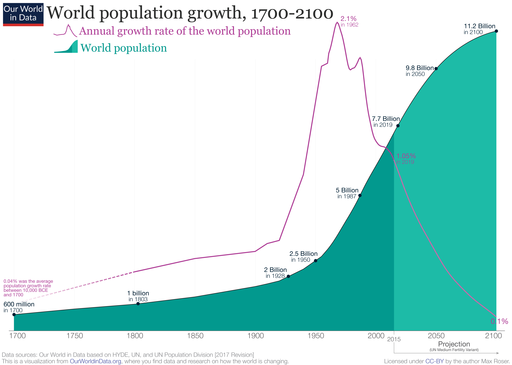
World Population Growth 1700-2100. Max Roser. Creative Commons Attribution-Share Alike 4.0 International license.
"There's scientific consensus, US Representative Alexandria Ocasio-Cortez (D-NY) said in a 2019 livestream on climate change, "that the lives of children are going to be very difficult. And it does lead young people to have a legitimate question: Is it OK to still have children?"
Less than three years later, AOC's mad at US Senator Joe Manchin (D-WV) for suggesting that perhaps Congress limit itself to one or two, rather than three, federal subsidies (from among a child tax credit, paid leave, or "universal" child care) in its multi-trillion dollar spending bill.
Ditto Bernie Sanders, who in 2019 indicated his support for population control to fight climate change, but in 2021 pronounces himself "delighted" by the expanded child tax credit and thunders that "we must now either make this Child Tax Credit expansion permanent or, at least, extend it for a number of years."
I'm agnostic on the relationship between population and climate change, but I can't help notice a contradiction when prominent progressives who claim to believe that overpopulation is a problem simultaneously support paying Americans to have more kids.
And that's exactly what schemes like the child tax credit come down to. It's a time-worn truism: If you want more of something, subsidize it. If you want less of something, penalize it.
True, those same progressives generally support using foreign aid to subsidize "family planning" elsewhere, but if overpopulation is the concern, that amounts to bailing water out of the bow of the boat and pouring it into, rather than off, the stern. At best.
At worst ... well, paying rich white people to breed and paying poor black and brown people not to sounds like something I'd expect to hear from a Tucker Carlson guest panel on "replacement theory."
In addition to being agnostic on the relationship between population growth and climate change, I'm agnostic on the desirability or undesirability of population growth as such.
Assuming certain conditions --- conditions which prevail in the United States, where contraception is inexpensive and widely available --- it seems to me that population growth is largely self-regulating.
The costs of having children correlate strongly with the conditions affected by population. Prices will reflect food aplenty, or not enough. Childcare will be easily found and inexpensive, or scarce and costly. Wages will be high and unemployment low, or vice versa. More or fewer people will choose to become parents based on those conditions.
Government subsidies in either direction disrupt the complex but largely rational operations of that "market." To at least some degree, they encourage having children when conditions say not to and discourage it when conditions say to go ahead.
Lowering taxes for everyone would be better policy than spending tax money on encouraging, or discouraging, parenthood.